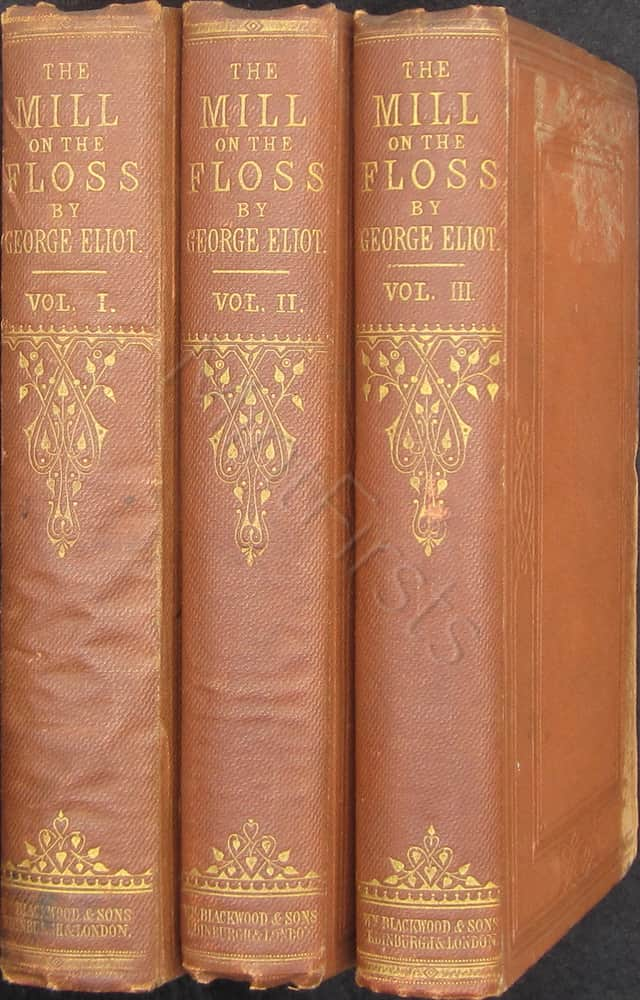Established
2004
Relaunched
2024
Our booksHow we tradeAbout usCredits & thanksYour account
- Home page
- Our books
- How we trade
- About us
- Credits & thanks
- Your account
- Your cart
MENU
The Mill on the Floss
First edition of George Eliot's The Mill on the Floss

George Eliot ⦗Mary Ann Evans, 1819–1880⦘
First edition. Second state with the inserted leaf advertising Scenes of Clerical Life and Adam Bede, and final blank z6 to rear of vol. 1. 3 vols. 8vos. Pp. [vi], [2], 361, [1, blank], [1, ads], [3, blank]; vi, [2], 319, [1, blank]; vi, [2], 313, [1, blank], with 16pp. publisher's catalogue (citing the 'Seventh Edition' of Adam Bede) to rear of vol. 3. Original diagonal ripple-grain cinnamon cloth (Carter's binding variant "A"), boards blocked in blind, spines titled and decorated in gilt, untrimmed edges; pale yellow endpapers.
Faded patches to the fronts and edges of boards left by removal of circulating library labels, page-wide tape-repaired tear to pp. 17/18 of vol. 1 (not affecting text), some light occasional spotting, moderate shelf-wear and bumping to extremities. A Very Good, sound set overall, with a little spine lean and a couple of hinges starting (but still tight) to vol. 1.
Eliot's second full-length novel and her most autobiographical, it met with immediate critical and commercial acclaim "and within four days [of publication] had sold 4,600 copies" (ODNB). The story of estranged siblings, Maggie and Tom Tulliver, set by the river Floss in Lincolnshire, whose relationship is fractured after Maggie is "innocently but irremediably compromised" on a boat outing by her cousin's fiancé.
Largely based on the author's own strained relationship with her adored brother Isaac Evans, who strongly disapproved of his sister's cohabiting arrangements with her married lover, George Henry Lewes. Alas, the novel's bittersweet reconciliation scene of the fictional siblings' final embrace (on the way to their watery grave), was not to have its hoped-for real-life equivalence. Eliot and her brother never reconciled.
[Carter, Binding Variants, pp. 110–111; Baker & Ross A5.1.a2; Sadleir 816a; Wolff 2060]
edition
first edition
format
hardback
publisher
William Blackwood and Sons
published in
Edinburgh and London
publication year
1860
volumes
3
height × width
20.5 × 14 cm
genre
literary fiction
language
English
binding style
cloth
binding state
original binding, joints cracked
condition
very good
GBP£ 750
EUR€ 878
USD$ 1,000
ref.C36 43U